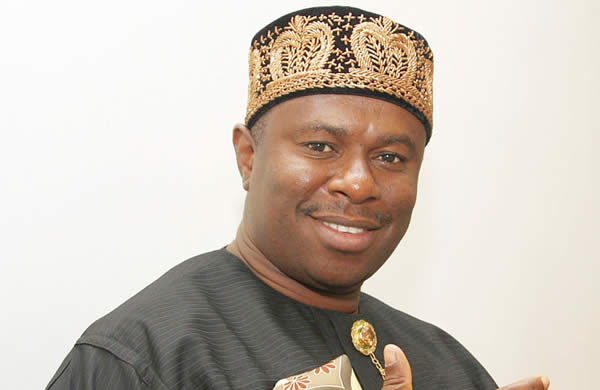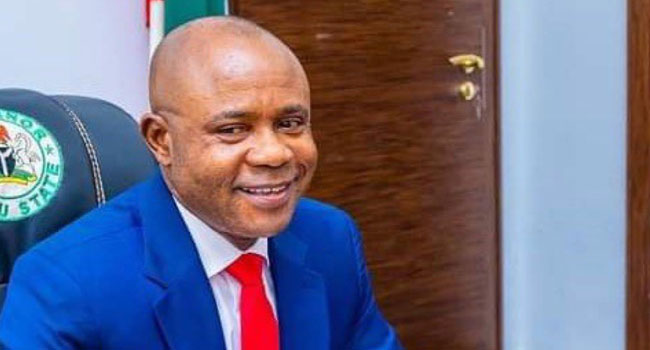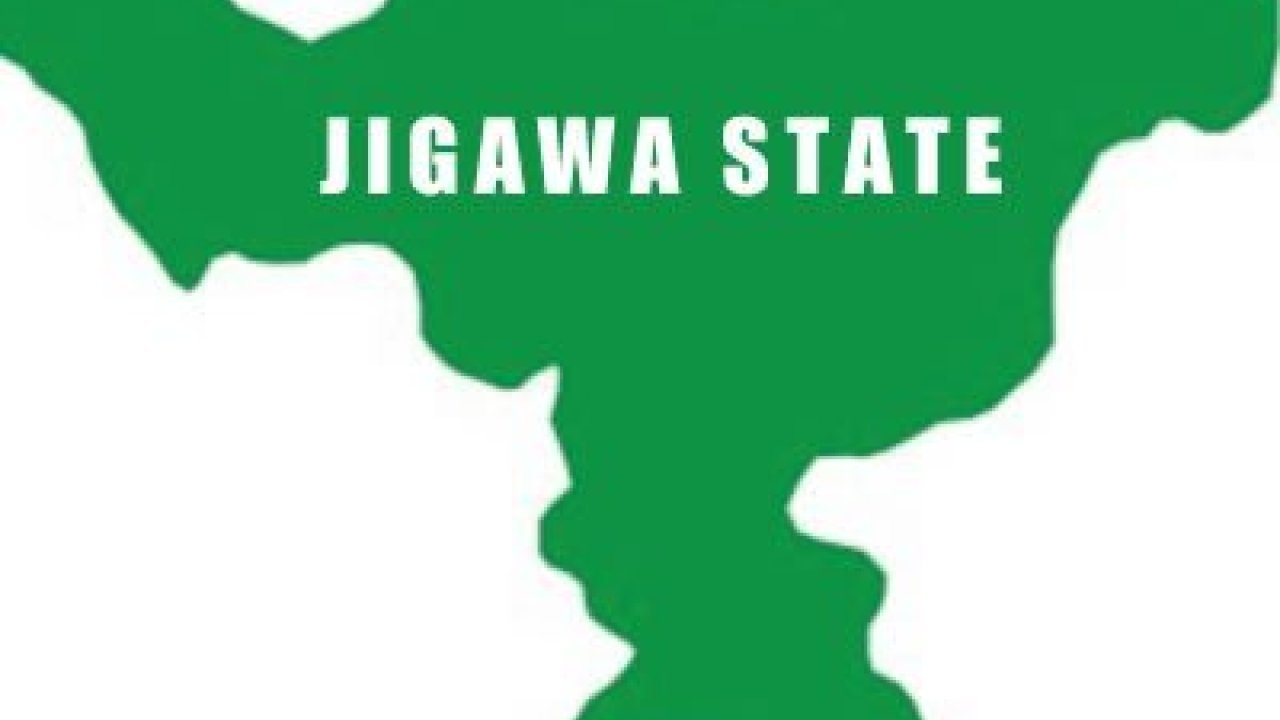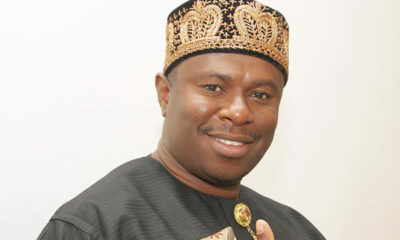News
The morality question

By Dakuku Peterside
There is unarguably a progressive value erosion in our country. This is happening increasingly, and there is no hope of it abating soon. This cankerworm is significantly influenced by westernisation and globalisation but with the shared responsibility of local catalysts like collapsed family systems, near extinction of communal oversight and accountability, abdication of moral reinforcement by religious centres, failure of governmental institutions and a skewed education curriculum that pays little attention to proper moral education and developing cultural personality identity.
The social-moral code which governs how individuals behave in a community setting has literally collapsed in most of our communities. Religious morality has been subdued by a craving for wealth and fanaticism not founded on love, truth, or honour. The elevation of money or accumulation of pecuniary wealth in the public space has become Machiavellian as the “end that justifies the means”. The ‘get rich quick syndrome’ is normalised. The effect of this malaise is evident to all; we see it, feel it, and analyse it, but beyond that, what do we do?
The most critical to my mind is the moral dimension of our public affairs. The decay is evident on a national scale. This is not to say that the other dimensions of our moral decadence are less critical. This column will, however, focus on the morality governing the conduct of public affairs, which needs to be more relevant. The decay is growing at a rate similar to our advancement as a country and the extent of our globalisation. It is as though the more advanced and interconnected we are with the rest of the world, the more immoral we become. Some recent manifestations of the decay in our public morality standards will help us appreciate the extent of the decay.
Historically, Nigeria has often witnessed corruption scandals of fantastical proportions at different times that have shown our decline from morality, as my friend Dr Lasisi Olagunju captured in his recent column “The History of scandals”. Each succeeding corruption scandal and sleaze makes the last one look like a child’s play in comparison, both in the audacity of maleficence and the amount of money involved. In the 1970s, Nigerians witnessed the “cement armada” scandal when the military government issued import licences to companies to import vast amounts of cement to build military infrastructure. The corruption in the cement price, the quantity supplied was far less than paid for, the demurrage paid for real and imagined ships carrying cement at the Nigerian ports, and the local and international court cases that ensued left a sour taste in our collective mouths.
The 1980s were marred with the infamous “rice scandal”; the government spent over $4b to import rice to feed a hungry nation. The rice was nowhere to be found, the monies grew wings and flew into thin air, and Nigerians and the international community marvelled at our leaders’ sheer level of wickedness and moral bankruptcy.
In recent times, Nigerians have seen the abdication of moral responsibility by those charged with handling our public affairs in favour of self-interest and material gain. You remember the Dasuki-gate. Billions of Dollars meant for combating terrorism and insecurity cannot be accounted for, and the same insecurity has ravaged our communities. You remember the billion-dollar fuel subsidy scam of the 2000s and its sad, lurid details. In this democracy, people collected subsidy payments for petrol vessels that had never come here or existed and falsified the amount of petrol supplied. A few well-connected Nigerians got away with murder in the subsidy scandal.
Most recently, there was the Senator Ningi Budget padding scandal of the National Assembly. The presidency presented a budget of about N27.5 trillion to our National Assembly, but controversy has trailed the budget with no solid explanation as to what happened. The story of magical ubiquitous solar lights and boreholes still haunts the integrity of the budget. This budget manipulation allegation is a moral question for the National Assembly. It has brought issues of transparency, abuse of power, the conflict between public interest and personal interest, and issues of fairness and equity to public attention. These issues raise questions about whether our National Assembly has any moral responsibility.
The most disturbing aspect of these scandals is that we do not learn lessons from them, and most perpetrators go unpunished. Nigerians are used to that and expect little accountability and responsibility from our leaders. Impunity reigns supreme, and things have fallen apart. Moral responsibility is an excellent sign of leadership, but this is vanishing in Nigeria. No leader ever takes responsibility for either failure of oversight or being complicit in a failure of the system to compensate morally for the pain associated with such failures.
No one resigns, apologises, or cares about the people, the victims. The reward for corruption in Nigeria is that perpetrators are given better opportunities to ply their trade. They are valuable to the corrupt system that requires the stealing of public funds to prop it up. Nigerians are used to hearing the names of people they believe should be in jail in new juicy appointments. In comparison, in Egypt, the transport minister, Hisham Arafat, resigned on moral grounds in late February 2019 after a deadly train crash in Cairo killed at least 25 people and left 50 others injured. Please understand that the Minister was not driving the ill-fated train. But he resigned on moral grounds.
One of the most striking features of contemporary Nigerian politics and politicians is that paradoxically, political rhetoric is increasingly moralistic while the actual ability of public officials to achieve moral ends is in decline. Our public officials see only shades of grey and operate in a world of contradictions, extreme selfishness, greed, deceit and double-speak. The moral corruption of our democratic process contributes substantially to a moral breakdown in all areas of society. Nigeria’s societal moral values, which govern the conduct of politics, business, and government, have often been corrupted. A society’s moral values define what people see as acceptable behaviour for themselves, what they believe behaviours they exhibit that others will approve of or not and what society collectively accepts or rejects as acceptable behaviour by individuals.
The various crises engulfing the contemporary Nigerian state manifest the breakdown of morality in almost all spheres of the country. The gruesome murder of 16 military personnel last Thursday while responding to a distress call during a communal crisis between the Okuoma and Okoloba communities in Delta State is a product of the failure of morals in the communities. The fact that youths who control both money and firepower in our communities no longer have respect for constituted authority and community elders indicates how low we have gone in morals. Our military, which we should revere for protecting us, has come under attack by the same people it is protecting. Daily, we are bombarded with stories of how our military personnel are dying at the hands of fellow Nigerians – bandits, terrorists, secessionists and now village vigilante groups. This is absurd and shows how low we have come as a society.
Chinua Achebe argued that a functioning, robust democracy requires a healthy, educated, participatory followership and an educated, morally grounded leadership. We do not have either morally grounded leadership or healthy, educated, participatory followership. It is little wonder our democracy has failed to rise in leaps and bounds. The importance of cultivating a solid moral foundation, both as individuals, politicians, and public officials and as a community, should be a priority programme. We must halt the drift, review our current modus operandi, look back into the pressures that have destroyed our public moral standards and values, and seek to rebuild our society based on meritocracy, fairness, and selflessness. We must focus on moral reinforcement rather than materialism.
The decline of moral values in our communities, particularly in politics and public life, should be a central concern. Politics does not rise or fall on the private righteousness of leaders. Leaders’ self-interest should always be tempered by moral conscience. We need to strengthen the guardrails of National morality such as the Judiciary , ICPC, EFCC and the Code of Conduct Bureau . We must effectively demand moral uprightness from public officials and celebrate those who uphold such high moral and ethical standards. We should have more role models of people with merit and resounding accomplishments. We must bring back the mantra that morality and hard work are worthy virtues and celebrate successful Nigerians in sports, art, music, science and technology, academia, business and entrepreneurship, and public leaders who shine as beacons of hope for a better, morally stable, and scandal-free society, where men and women of goodwill and conscience will thrive for the benefit of humanity.
Dr Dakuku is a Public Sector Turnaround Expert, leadership coach, Public Policy Analyst and Columnist
News
NASS assures Information Ministry of improved funding in 2025


The Chairman, House Committee on Information, Ethics and Values, Rep. Olusola Fatoba, has assured of improved budgetary allocation for the Ministry of Information and National Orientation in 2025.
Fatoba disclosed this when he paid an oversight visit to the ministry in Abuja.
“We are on the same page with the Minister on the issue of low budgetary allocation for the ministry in the 2024 budget. The Ministry cannot perform its function effectively with poor funding.
“We would do everything within our powers, including lobbying, to ensure that the ministry is better funded to perform its function of educating Nigerians on government programmes and policies.
“We would also work with stakeholders to ensure improved budgetary allocation for the Ministry in the 2025 budget to enable its carry out its functions effectively, and deliver on its mandate,” Fatoba said.
Earlier, the Minister, Alhaji Mohammed Idris, had said that in a meeting with the committee in 2023, discussions were targeted at improved funding for the information and orientation sectors of the country.
“I know the efforts that the chairman and members of the committee, together with their counterparts in the Senate, put in to ensure that my ministry is properly funded to execute its mandate.
“Theirs, and our combined efforts have not given us the kind of budget that we should have for this ministry in view of the transformative journey that the ministry has embarked upon.
“We believe that the ministry has a critical role to play in ensuring that everything that the government wants to do is properly communicated, and Nigerians get to know, understand and support government policies and programmes.
“However, criticism is a very healthy thing and we all know that president Bola Tinubu is a democrat, who is always open to criticism that is healthy, progressive and aimed at moving the country forward.
“At the ministry, are not happy with the kind of budget that we have, because the allocation being made for the ministry is, to say the least, very meagre,” Idris said.
The minister lauded the committee for its support, adding that the executive was looking at the challenges being faced by the ministry to ensure that it got the appropriate funding to transform the sector.
Idris said that sometimes the ministry had to go the extra mile to use its contacts and goodwill within the industry to get things done.
“I think that Nigerians, especially the media, are very ready to help but of course, we also know that they are in business. They need to power their generators and pay their staff.
“Therefore, we also need to pay them. We should not take the relationship for granted,” Idris said.
News
Workers Day: Be patient with us —Gov. Mbah begs workers


Gov. Peter Mbah of Enugu State has appealed to workers in the state for patience, saying he remained committed in doing everything needed to make their condition better.
Mbah made the appeal at the 2024 Workers Day Celebration held at Okpara Square in Enugu on Wednesday with the theme: “People First.”
He said his administration would stop at nothing until it achieved workers’ welfare and would strive to fulfil his campaign promises.
The governor, represented by his Deputy, MrIfeanyiOssai, while acknowledging that workers needed improved wages to meet economic realities in the country, stressed that the income they received currently hardly met the basic needs of life.
“We all go to the same market, buy from the same petrol station and shops and children go to the same school and hospital.
“Be patient with us because we are putting things in place with the means available to the government to make life better for all of us.
“Wage award will not solve all the problems as it is just a palliative to cushion the effects of the hard economy and that is why we are building a system that will solve the problems in the long run,” he said.
He added that: ”You can witness the revolution in road infrastructure, aggressive work at International Conference Centre, the awarding of a contract to rebuild Hotel Presidential and revitalisedNigergas Company.”
On the state’s investment in SMART Schools, the governor said the government desired to do more but lacked the resources to meet them
“That is why we try to create wealth, and have been aggressive on our foreign and local investments and creation of jobs.
“And our wish and efforts is that in years to come, the workers will live beyond what they are currently facing.”
The governor further explained that his administration was building the SMART schools to train Enugu children for the future as well as improving public schools and healthcare systems.
He stressed that with an effective transport system, pressures on families would reduce as their would be no additional cost in maintaining their cars.
While commending workers for the support they had received from them since they assumed office, he promised to look into pension issues to ensure that every retiree got paid.
“I want to thank you for your hard work and commitment in driving government policies to ensure that they benefit the people,” Mbah said.
Earlier, the State Chairperson, Nigeria Labour Congress (NLC), Comrade Fabian Nwigbo, said the removal of fuel subsidy without anything in place to cushion the effects, created a lot of hardship for workers who received N30, 000 as minimum wage.
Commending Mbah for all his government was doing in the state, the chairperson urged him to ensure that after the verification of pensioners, payment of arrears of gratuity should commence to alleviate their sufferings.
He equally appealed to him to direct payment of arrears of pension to State Parastatals, Primary Schools and Local Government retirees.
On his part, the state Chairman, Trade Union Congress (TUC), Comrade BennethAsogwa, urged the governor to harmonise gratuity for state and local government retirees.
He also called for the review of the termination of the appointment of some staff of the Enugu State College of Education (Technical).
While lauding the governor for various developmental strides in the state, Asogwa equally appealed to him to regularise appointment of some civil servants recruited in 2012 by the Coal City Transport Services.
The highlight of the event included a march past by different labour unions in the state.
News
Jigawa announces new programme for civil servants


Jigawa Government has announced a new agricultural programme called “J-Agric” to ensure a brighter future for civil servants.
Gov. Umar Namadi announced the programme on Wednesday in Dutse at the 2024 Workers Day celebration.
He explained that under the programme, the government would provide opportunities for workers to invest in agriculture.
He said, “I’m glad to unveil a new programme initiated by this administration to secure the present and future lives of our workers.
“A sustainable agricultural programme is underway to provide free farmlands and financial loans to Jigawa civil servants for the purpose of agriculture.
“The state government, through the J-Agricprogramme, will provide greater opportunities for workers to invest in agriculture.”
Namadi added that under the programme, the government shall facilitate workers’ easy access to farmlands and credit facilities through cooperatives and other financial institutions.
This, he said, is to assure workers and their families a brighter future even after retirement.
“This is part of the administration’s plans through deliberate policy to improve the lives of people and food security,” Namadi said.
The Chairman of the Nigeria Labour Congress, MrSunusiAlhassan, commended the governor for the gesture.
Alhassan, however, urged the state government to expedite the launch of the programme as the rainy season is fast approaching “so as to ensure maximum benefit for all.”
-
capital market2 years ago
Rt.briscoe, FBNH, Others halts negative performance of stock market
-
Finance3 months ago
Court orders Sen. Victor Umeh to repay N136m bank debt to AMCON
-



 Abuja Update2 months ago
Abuja Update2 months agoUNDP, FG partnership needed to achieve inclusion, equity- Minister
-
Abuja Update1 month ago
Banks drive stock market performance with N147bn gain
-



 Business1 week ago
Business1 week agoTingo Group unveils Tingo Electric, Tingo Cola drink at Lagos launch
-



 Health2 weeks ago
Health2 weeks agoCapacity training will reduce migration of health workers- NPHCDA
-
News4 months ago
Oil thieves sponsoring malicious media campaign against Navy – Spokesman
-



 Infotech1 month ago
Infotech1 month agoWorld Backup Day: NITDA urges Nigerians to ensure backup of data








